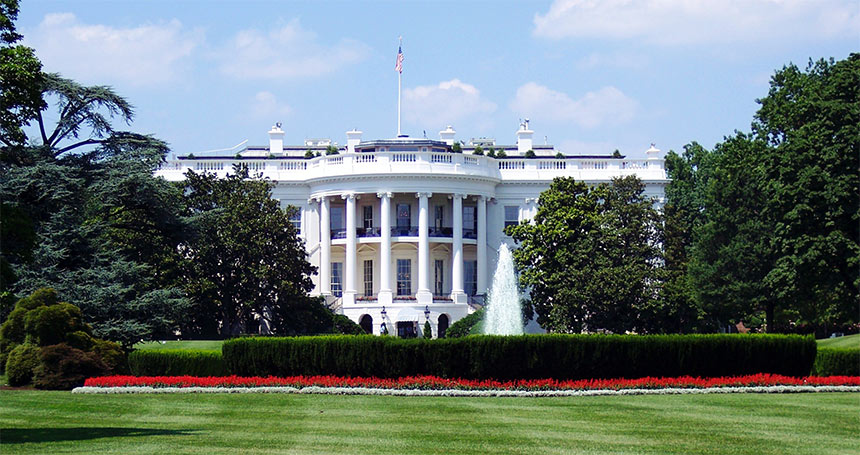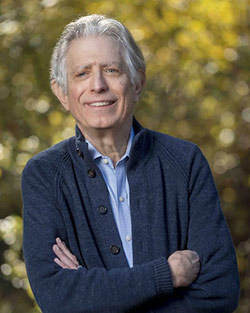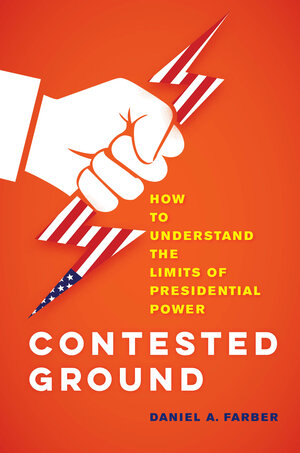
By Andrew Cohen
Donald Trump’s presidency ignited fiery exchanges about the benefits and perils of expanding presidential power. But as Berkeley Law Professor Daniel Farber explains in his new book, it simply marked the latest chapter in a compelling history of constitutional debates and political maneuvering when it comes to how far the executive branch can push the envelope.

In Contested Ground: How to Understand the Limits of Presidential Power, he tracks how such power — and the arguments surrounding it — have evolved from the Framers’ time through modern-day discourse. A prominent constitutional law expert who has taught at Berkeley Law since 2002, Farber helps readers suss out intriguing political, historical, and legal factors at play, providing a nuanced and timely primer regarding the checks on presidential authority.
The book — Farber’s 23rd — delves into how such authority plays out in myriad situations, from appointments and removals to wars and emergencies. In doing so, it probes the ways in which America’s government branches clash and the factors driving the evolution of law in this area, including the ebb and flow of constitutional politics.
While striking the proper balance between curbing abuse of executive power and enabling its use when needed is no easy task, Farber says the importance of getting it right — and the implications of getting it wrong — carry major consequences.
He recently discussed Contested Ground, released for publication today, and the issues it explores.
What sparked your interest in this topic, and in writing the book?
Presidential power and its abuses have been in the spotlight since I was in law school during Watergate. It’s been a particular hotspot since the beginning of this century — think of the War on Terror under Bush, DACA under Obama, and Trump’s travel ban. It’s also an area that’s been part of my scholarship, maybe most importantly in my book on Lincoln and the Constitution. Lincoln was denounced as a would-be dictator during his lifetime, and I took a deep dive into the legality of his Civil War actions.
It all came together when an editor at UC Press heard a talk I gave on presidential power at the Free Speech Café on campus. When she suggested the idea of a book on presidential power, I started thinking about the need to give people some kind of map for navigating all the partisan and ideological debates on the subject.
Were there any major surprises you encountered in your research?
There were a couple surprises. A lot of the arguments for a very expansive view of presidential power are based on the idea of original intent. I’ve always found this a debatable approach, but I assumed that the history did support that vision of the presidency. It turned out the historical basis was a lot shakier than I expected.

At the same time, when I started looking at Supreme Court opinions on a wide range of issues involving the presidency, I found there was more of a common thread than I expected. Most opinions adopt a nuanced approach rather than embracing one extreme or the other. That was a surprise to me and maybe to readers.
How did the Framers view the perils of unchecked presidential power?
The Framers definitely wanted a strong presidency, but they were very much aware of the risk of abuse of power. They were heirs to centuries of struggle against overbearing English kings, a struggle that they themselves had experienced. They were also students of history and knew how often unscrupulous leaders had overturned legal restraints. The Constitution was an effort to strike a balance between the risks and benefits of a strong chief executive.
From a historical perspective, which presidency tested the limits of executive branch authority the most and what lessons should we learn from that?
Looking back over the full scope of our history, many of our strong presidents from Lincoln to FDR to Reagan expanded presidential power to its constitutional limits and sometimes beyond. Nixon has been the poster child for abuse of power, but it was probably Trump who has been the most willing to ignore established norms of presidential practice. In fact, my colleague John Yoo has praised Trump for showing just how far presidential power can stretch.
The lesson of history is that presidents of all political persuasions have been aggressive in the use of their powers in pursuit of what they consider the national interest. Sometimes that’s been for good ends, sometimes not. That makes it all the more important to understand the web of legal doctrines and institutions that can both restrain them and empower them, depending on circumstances.
What is the nondelegation doctrine, and how has its return to prominence affected the landscape here?
The nondelegation doctrine says that Congress can’t transfer its lawmaking power to the executive branch. Yet Congress constantly gives the executive branch the power to issue binding legal rules in areas ranging from national security to the environment. The question is, when does the Executive have too much discretion over those rules? Only twice in U.S. history has the Supreme Court ruled against the executive branch on this question.
Today, however, conservative justices are on the verge of imposing much more stringent restrictions on the kinds of rules that executive agencies like the EPA and OSHA can issue. Scholars worry that the Court could use this doctrine to gut federal environmental protections, financial regulations, and public health laws. In other words, there’s a risk of a wholesale regulatory rollback by the courts.
Can you expound a bit on how constitutional law isn’t static, but rather evolves based on its inextricable link to constitutional politics, and how that impacts presidential power?
In Washington and Jefferson’s time, the U.S. was a minor actor on the world stage, with a government that you could have easily fit inside any one of the buildings now lining Constitution Avenue. Our army was smaller than the police forces of some major cities today. Now, we’re a global superpower with a massive executive branch administering everything from the Social Security system to vaccine approvals.
The role of the president has evolved along with these circumstances. Some of the framers worried that future presidents would be puppets of Congress; instead, presidents today are the focal points of American politics and the fulcrum of American government. But presidential powers are always contested, with supporters and opponents invoking the Constitution on their side of the debate.
How crucial is it to have the same rules apply to all presidents, and what are the main obstacles to achieving that goal?
I really can’t overemphasize the importance of this, especially in today’s polarized political climate. Many people today passionately support some presidents and equally passionately hate others. The number of people in the country who admired both Obama and Trump could probably be counted on the fingers of one hand. But if constitutional rules are going to have any meaning, they have to mean the same thing whether we love or hate a particular president.
That was brought home to me in working on my book on Lincoln. I admire Lincoln enormously and didn’t feel much concern about his doing whatever needed to be done to save the Union. I had to constantly remind myself that whatever powers the Constitution gave to Lincoln, it also gave to some of his far less worthy successors. It’s the same today. Whatever powers you give to one group of presidents, say Biden and Obama, you’re also giving to another, say Bush and Trump. That’s one reason these issues are so hard: We want to empower presidents to do good and necessary things, but doing so inevitably empowers them to pursue policies we hate at the expense of values we hold dear. That’s what my book is about.